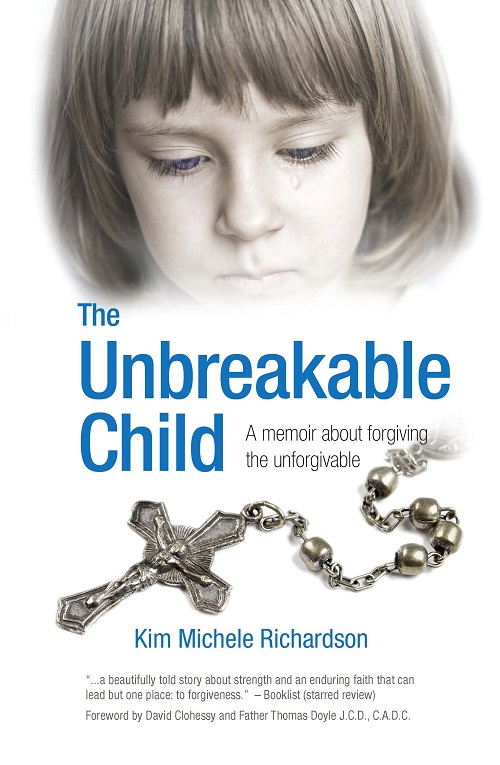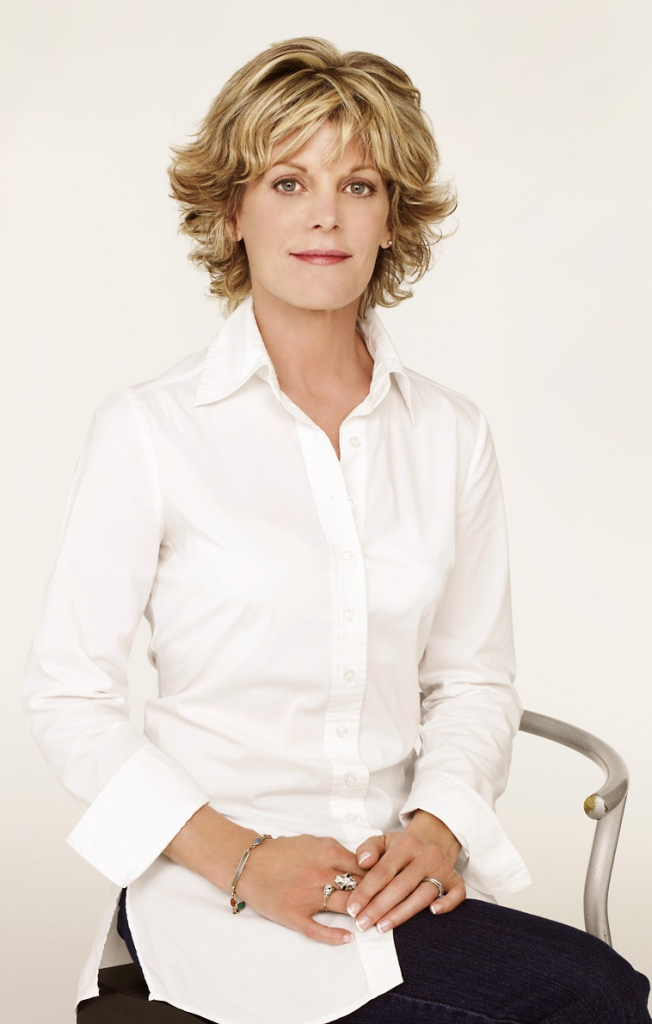AUTHOR INTERVIEW: Kim Michele Richardson – Part 1
By Jan O'Hara | January 7, 2011 |
These days, getting and staying published requires a larger skill-set than understanding point of view, plot and character. Rather, most would say it requires grit, determination and tolerance for life in the public eye. When I look for models of writers who possess those traits, I think of Kim Michele Richardson, author of The Unbreakable Child.
Kim is a survivor of child abuse. In 2004 she entered the office of William F. McMurry and embarked on a lawsuit against the Sisters of Charity of Nazareth at the St. Thomas St. Vincent Orphanage in Kentucky. Though it took years, she and forty-four other plaintiffs triumphed. They received the first-ever monetary settlement paid by Roman Catholic nuns in the United States to victims of institutional abuse in an orphanage.
But Kim didn’t stop there. She wrote a memoir — one which bears a near-perfect score on its Amazon page and a starred review from Booklist. The latter said the following: “Richardson’s candid accounts are chilling, and the strength she shows — with a very supportive husband at her side — is inspiring. Remarkably, she did not abandon the Church and in fact sends her children to Catholic schools. Hers is a beautifully told story about strength and an enduring faith that can lead but one place: to forgiveness.”
Although you need to understand the basis of her book to understand why I’m asking Kim the questions below, our interview focus is not about religious or political issues. Writer Unboxed seeks to empower the fiction writer. Kim has unique experiences that I believe speak to that mission statement.
Jan: Welcome, Kim! We’re glad to have you here.
Kim: Thank you and your readers for having me!
Kim, why did you begin to write The Unbreakable Child?
During the lawsuit, I kept a journal for catharsis.
My then journal, less than a hundred pages, weaved past through present as the current day events played out at the time. Upon conclusion of the lawsuit it was given to William F. McMurry, my real life protagonist in The Unbreakable Child, as gratitude for his hard work and to show him his own self worth. More importantly, to learn from past history, stamping history, so that history does not repeat itself to ensure the safety of vulnerable children.
In TUC, you make it clear that the lawsuit forced you to reach a new level of forgiveness towards your abusers. Did the process of writing your memoir contribute to that growth? If so, can you elaborate?
Forgiveness is such a powerful weapon for any survivor or victim of crime. Not to be confused with justice or an excuse; it is the beginning of a process toward moving forward to heal. I believe any time you can express your feelings whether it is with art or words, it becomes a band aid to promote healing.
If people aren’t getting the idea you possess tenacity, I suspect this next segment will prove enlightening. Can you tell us about your road to publication?
Over four years ago, I began researching and learning about agents and traditional publishers, spending thousands of hours doing such. Then in 2007, and after thousands and thousands of hours of hard work and many, many drafts later, an agent took on my work. A month later The Unbreakable Child was put up for auction. I remember the nerve-wracking week clearly. Ted Kennedy’s newest memoir was up for auction as well. And while the publishing world was in a buying frenzy for Kennedy’s book, Unbreakable could not gain traction. The Unbreakable Child, the first-book of its kind in mainstream publishing, simply wasn’t ready, nor was the publishing world ready for it. It would take more drafts and many more hours to finally land a publishing home.

Eventually, my then agent placed TUC with what appeared to the publishing world as an up-and-coming, prize-winning publisher. I gained emotional reward immediately by donating the proceeds of the sale to two advocate groups.
Upon release of publication, The Unbreakable Child earned a rare Starred Review from Booklist and quickly gained a wide readership, picking up great momentum. I found myself working 24/7 on promotions. I was rewarded. TUC went into a second printing after only one month out.
Then came bad news.
Unbeknownst to me and my literary agency at the time of The Unbreakable Child’s sale, the former publisher took on my book when its house was experiencing financial difficulty. The Unbreakable Child did extremely well in its short, three-months-out, but in August 2009, the former publisher and his group of private investors closed shop, taking with them every cent of large earnings due, which was earmarked to help others.
That would be enough to stop most authors in their tracks. How did you respond?
I was devastated and overwhelmed. I found the odds of placing a pre-published book with another publisher are not high. The odds of placing a memoir of a non-celeb and a book regarding abuse, even lower. The reasons for this are complicated and many.
Shortly after, I received correspondence from the president of a dream publishing house. He had just taken on another memoir, but still wanted to read mine. His kind words, so tender and full of praise, inspiration and encouragement, fueled me forward with renewed strength.
I know you to be a person who tries to focus on the best people have to offer, but his wasn’t your only encouragement, was it?
I’m forever grateful for the kindness and tremendous support the publishing world, author advocates and fellow writers extended to me at this time. And for the generous agents and editors who cheered me on from the sidelines and kindly left their doors open for me to bounce off questions.
Two large distributors offered to take my book and move it back into the libraries and the world. Still, I had reservations about becoming my own publisher and even more so; learning the ins and outs of such a huge complex business. Along with a few other concerns. A daunting task for sure.
And two agents immediately offered representation; one, after reading only thirty pages. But this didn’t feel right to me.
I worried. The Unbreakable Child was gaining speed, even though abandoned; it had now reached high schools, universities, social workers, etc. I knew TUC was on the cutting edge for speaking out on what is now a Humanity Crisis with Catholic Clergy and US orphan abuse. TUC is still the first-ever and remains the only book of its kind in mainstream publishing. I felt, for me, it was essential to stay on the traditional publishing route by gaining reputable literary representation for the protection of my work and my literary career.
With time on my side, I used it to my advantage to strengthen my writing and learn. More revisions were afforded and thousands of hours later, I landed an amazing and wonderful literary agent, who was passionate about my work and who placed The Unbreakable Child with an equally passionate mainstream publisher, who is reputable and honest. There, it has found its “forever home”.
In fiction, people are encouraged to “write what they know” which means many will draw from their autobiographies. However, that comes with potential risk: They might write a book that’s more about venting or personal therapy than one set up for the reader’s requirements. If the writer hasn’t worked through their own issues before publication, they might have to do so while the public watches and judges. Any advice around this subject?
For a memoirist, a book must offer two important components for a reader; hope and resolution. Each writer’s journey or path taken to reach such is diverse and personal.
Every writer makes mistakes in their journey to publication. Be kind to yourself — learn to embrace those mistakes and see them as opportunities as opposed to obstacles, then tuck them away to use as constructive lessons for the future.
Cliché but very true; be the little engine that could.
Jan here: This concludes Part I of our interview. In Part II, we’ll be discussing reader guides, rewards of authorship, and Kim’s perspective about building platform and promotion. Until then, should you care to learn more about either Kim or her book, please stop by her website or blog.
Comments are welcome in the space below, peeps, but please confine their content to issues about writing. Thank you in advance for respecting that boundary!
Kim’s photo courtesy of Andrew Eccles.
Click here for Part 2 of Jan’s interview with Kim Richardson.










Kudos on a great interview, Jan.
Excellent interview, Jan. Thanks for sharing your story with us, Kim. I look forward to part 2!
Moving story. Congratulations on dealing with such calamity in this way.
It reminds my of Karen Armstrong’s book, “Through the Narrow Gate”.
As Therese said, thanks for sharing your story with us.
[…] today on Writer Unboxed is Part I of my conversation with Kim Michele Richardson, author of The Unbreakable […]
A touching story, very inspiring. Thank you, Jan and Kim.
Great interview, Jan and Kim. Can’t wait to read part 2!
Great interview Jan! Bravo to you and THE Little Engine Who Could (And Did/Does). :)
Wonderful interview from two warm and generous women I respect and admire!
Compelling interview, Jan. Really moving and a testament to perseverence – in Kimmi’s life and in her quest for an audience for her book. I read the book some time ago. It’s a riveting story and deserving of much success.
Excellent interview! Looking forward to part 2!
kim’s memoir is incredible.
no wonder why, i had the pleasure
of meeting her in 2009 and she
is so vibrant and kind and beautiful
in person–inside and out.
thanks for a great interview, jan.
and wishing more coverage and success
for your novel, kimmi!
Great interview.
A great story about perseverance.
I can’t wait to see part 2!
A stunning story. Makes me feel blessed by an entirely uneventful (in contrast) childhood. Your story is one for all writers to draw encouragement from, whether for fiction or non-fiction. Thanks.
Thank you all for reading and commenting! :)
“Hope and resolution…” lovely interview~
Wonderful interview. I look forward to part two.
Thank you for all the wonderful comments and to Writer Unboxed for having me. x0
[…] you missed it, Part 1 features one of the most arduous struggles to publication I’ve yet encountered. Today’s […]
[…] the Unbreakable Child, wrote an article on Crafting the Unbreakable Writer. If you remember, I interviewed Kim in January, and she chose to quote part of that post and link to […]